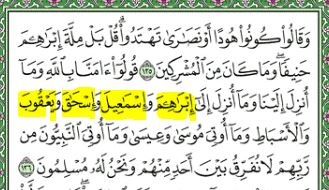
السلام عليكم و رحمة الله
We’re down to the third and last indicator of جَرّ (jarr), which is فتحة (fathah). Now, before we go further, I want you to be familiar with something called “partial flexibility“. It’s a longer read, so if you’re short on time skim through it for now, and go back to it later to make solid. This segment won’t make much sense until you review that concept, so please take a look.
When fathah will substitute for kasrah as the sign of خفض
First the rule:
وَأَما الفَتْحَةُ فَتَكُوْنُ عَلامَةً لِلْخَفْضِ فِي الاسْمِ الذِيْ لا يَنْصَرِفُ
As for fathah, it is a sign of khafdh in the اسم that is not fully flexible.
There is only one situation where fathah will be used to show that a word is in the state of jarr, and that’s when we’re dealing with partly flexible nouns (nouns that don’t take tanwin).
Some examples:
- صَلّى اللهُ عَلى إبْراهِيْمَ خَلِيْلِهِ (“May God bless Ibrahim, His friend”)
- رَضِيَ اللهُ عَنْ عُمَرَ أمِيْرِ المُؤمِنِيْنَ (“May God be pleased with Umar, the leader of the believers”)
The words إبراهِيْمَ and عَُمَرَ are both in jarr because each of them has one of the particles of jarr before it (عَلى and عَنْ, respectively), but they have a fathah at the end instead of a kasrah because they are partly flexible. They are partly flexible because إبراهيم is a non-Arab name and عُمَر is a proper name that has been adjusted from its original form.
Now (about to drop a tiny little exception, but bear with me please!), if the word has ال (“the”) added to the beginning or is mudhaaf (the first word in an idhafah), then it will take a kasrah in the state of jarr.
- وأنتُمْ عاكِفُونَ في المَساجِدِ (“while you are staying in the mosques“) – The word مساجِد is partly flexible because it is an “utmost plural”. It is in the state of jarr because of the particle فِيْ before it. It shouldn’t be taking a kasrah, but because it has ال added to it, it breaks the rule
- مَرَرْتُ بِحَسْناءِ قُرَيْشٍ (“I passed by the beauty of Quraysh”) – The word حَسْناء is partly flexible because has been feminized using an alif. It is in jarr because of the particle بِ before it. It also shouldn’t be taking kasrah but because it is mudhaaf, it does.
From the Quran
Below from Surah 2: 136 are the some names of non-Arab prophets (عليهم السلام).

- إبراهيم is in jarr because of the particle إلى (“to)
- The other words are connected to إبراهيم using و (“and”), so they have the same status
From Surah 18:79, we see an example of an “utmost plural”. It’s in jarr because of the particle لِ before it, but has a fathah because it’s partly flexible.

Question
- What are the situations in which fathah will indicate that a word is in jarr?
Until next time, السلام عليكم و رحمة الله و بركاته
Like this post? Simply enter your e-mail and click “Yes, include me!” for updates
Leave a Reply